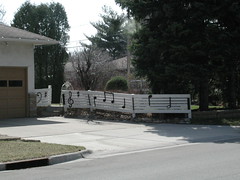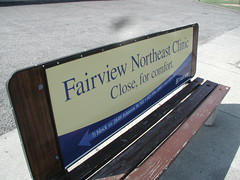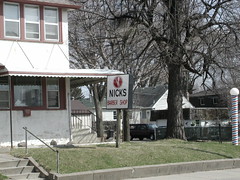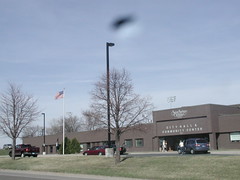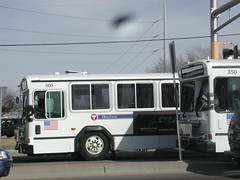Today, the teaching and research assistants working on the University of Minnesota's Minneapolis campus began voting for a proposed TA/RA student union. For the past couple of weeks, the university, through the Office of Human Resources, has been sending out emails to all of us TAs and RAs, telling us about the university's take on the issues and reminding us how important voting was, since only the folks voting would decide whether or not the union would exist. In other words, as the university is fond of putting it: If only 500 graduate students vote, and if bare majority of them support the union, then all 4500 graduate students will be spoken for by this small group of students.
Now, I understand that it might not be in the University administration's interests to have to deal with another union, especially during times of funding-uncertainty, but I didn't think that the university would be so heavy-handed and cloddish in their campaign against the union. Though there haven't been roving gangs of thugs beating up union supporters, the emails TAs and RAs have been receiving are as transparant as they are unsophisticated.
Look at part of an email they sent last week, warning us about union dues:
While the union is eager to proclaim what they will do for you, here is a sample of the approximate annual dues for other unions on campus:
AFSCME (Clerical) $415
LELS (Police) $444
AFSCME (Technical) $445
UEA (Duluth Faculty) $1100
If the United Electrical, Radio, Machine Workers of America were to charge the average of these amounts, the total revenue the union would generate from graduate assistants exceeds $2.7 million dollars a year. By law, the union can require all graduate assistants to pay a fair share fee, which can be up to 85 percent of the regular dues.
What will the Union do with your money? How much of this money will go to their state and national offices? How much will be spent on lobbying on behalf of electrical, radio, and machine workers? These are questions that all graduate assistants have a right to ask before casting a ballot, especially when this union is already meeting to plan your future, but refusing to let you participate unless you are a union supporter.
Though the union-that-might-be has
expressed a set of goals that would involve negotiating salary increases and healthcare benefits, I think
proclaim is a little much, in how it conjures up images of dirty socialists standing atop wooden crates with voice-trumpets excreting calls for anarchy. No, by and large, this has been a quiet campaign, one almost bereft of public debate (an aspect I naturally find unsettling since the union would ostensibly be speaking for
all TAs and RAs on campus). And even if there is a literal sense in which the union has
proclaimed--letting known in public what its goals are--the word seems rather charged, relative to the typically bland and technical language university letters and emails generally employ.
What's even sillier, though, is the "sample" the university offers in order to warn students of out-of-control union dues. This might be a demonstration of "how numbers lie."
Look at the comparison: clerical workers, police, technicians, and
faculty members on Duluth's campus. Are graduate students roughly analogous to any of these groups? I don't think so. Not in respect to either duties or income, at least. From what I've been told, union dues are a percentage of our incomes. And, since most of us make, on average (oh, how tricky these are!) around $10,500 annually, it seems highly improbably that we would be paying the same amount of dues as folks earning three to six times as much as we do. Also, from what I understand, the graduate student union expects to charge $15 a month for dues. Multiplied by 12 months, graduate union members would be paying about $180 annually. Naturally, I have no way of confirming these claims, except to repeat what the union reps told me. But, regardless of my own uncertainty about these facts, the university could have done the reasonable thing and compared our future dues with those of comparable unions--perhaps student unions at other public universities?
And look at the
averaging move they made! Even I know, with my paltry math background, that the problem with averaging is that it tends to skew data if there is a significant disparity between the items being sampled. So, if there were 100 people in the sample, and one person made a million dollars annually while the other 99 made $10000 annually, then, on average, everyone would make $19900 annually (or twice what 99% of the people were actually making)! Given that the university has included faculty members of Duluth and their $1100 dues in its calculations, the graduate student union might expect to pay $601 annually--about $200 more than three-out-of-the-four unions sampled. Unions that, to begin with, are arguably not representative of graduate students anyway!
How frustrating that the university has decided to use such strained numbers! If the university doesn't think we'll take these numbers seriously, then they are just silly and churlish in their use of useless statistics. But, if the university actually thinks that some of us will be swayed by these figures, how little does that mean they think of us?
Update: Welcome, Carnival of Education Readers! Just to let you all know, the election results are in, and the union proposal was defeated. I just hope it wasn't because of those emails.


